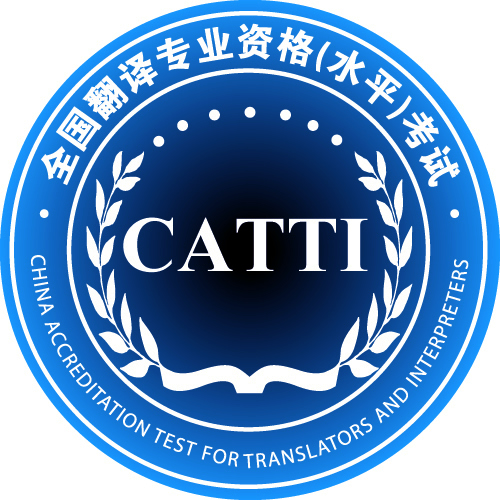Introduction to CATTI
来源:
Entrusted by the Ministry of Human Resources and Social Security of the People’s Republic of China, China International Publishing Group (CIPG) is responsible for implementing and administering China Accreditation Test for Translators and Interpreters (CATTI) ━ the national professional qualification test. CATTI has been incorporated into the national system of professional qualification certificates. It is a translation and interpretation professional qualification accreditation test which is implemented throughout the country according to uniform standards and which meets social needs. It is designed to assess examinees' bilingual translation or interpretation proficiency.
CATTI was introduced in 2003. By the second half of 2013, English, French, Japanese, Russian, German, Spanish and Arabic Levels 1, 2 and 3 translation and interpretation 43 tests including English simultaneous interpretation test were held across the country.
Testing Time
In May English, Japanese, French and Arabic Levels 1, 2 and 3 translation and interpretation tests were held.
In November Russian, German and Spanish Levels 1, 2 and 3 translation and interpretation tests, English Levels 2 and 3 translation and interpretation tests and English simultaneous interpretation test were held.
Translation Test
|
Level |
Item |
Method |
Time |
|
Level 1 |
Translation Practice |
Writing directly on test papers Examinees can bring two paper dictionaries |
180 minutes |
|
Level 2 |
Translation Comprehensive Aptitude |
Writing directly on test papers |
120 minutes |
|
Translation Practice |
Writing directly on test papers Examinees can bring two paper dictionaries |
180 minutes | |
|
Level 3 |
Translation Comprehensive Aptitude |
Writing directly on test papers |
120 minutes |
|
Translation Practice |
Writing directly on test papers ? Examinees can bring two paper dictionaries |
180 minutes |
Interpretation Test
|
Category |
Level |
Item |
Method |
Time |
|
Consecutive Interpretation |
Level 1 |
Interpretation Practice |
?On-site recording |
60 minutes |
|
Level 2 |
Interpretation Comprehensive Aptitude |
Listening to the tape and answering questions in writing as required |
60 minutes | |
|
Interpretation Practice |
On-site recording |
60 minutes | ||
|
Level 3 |
Interpretation Comprehensive Aptitude |
Listening to the tape and answering questions in writing as required |
30 minutes | |
|
Interpretation Practice |
On-site recording |
60 minutes | ||
|
Simultaneous Interpretation |
? |
Interpretation Comprehensive Aptitude |
Listening to the tape and answering questions in writing as required |
60 minutes |
|
Interpretation Practice (simultaneous interpretation) |
On-site recording |
60 minutes |
Examinees
CATTI’s translation and interpretation testing sites have been set up in 31 provinces, autonomous regions and municipalities of the People’s Republic of China. Examinees take an active part in CATTI. From 2003 to 2015, 460,000 examinees participated in CATTI, and 60,000 passed it and obtained translation or interpretation certificates.
Use of Translation and Interpretation Certificates
Connected to employment
The Ministry of Foreign Affairs, CIPG, China Translation & Publishing Corporation and more and more translation employers take translation or interpretation certificates as essential or preferential requirements for employment.
Connected to professional titles
Those examinees who pass CATTI and obtain translation and interpretation certificates acquire corresponding translation and interpretation professional titles.
Senior translator or interpreter → professor of translation or interpretation
Level 1 translator or interpreter → associate professor of translation or interpretation
Level 2 translator or interpreter → translator or interpreter
Level 3 translator or interpreter → assistant translator or interpreter
Connected to translation industry
Holders of Level 1 and senior translator or interpreter certificates can become expert members of the Translators Association of China.
Holders of Levels 2 and 3 translator or interpreter certificates can become common members of the Translators Association of China.
If postgraduates studying for the Master of Translation and Interpreting do not obtain CATTI’s Level 2 translation or interpretation certificates and above before admission, they should participate in CATTI’s Level 2 translation or interpretation tests.
Testing Experts
CATTI has a sound and stable contingent of experts, 28 top-notch experts from the translation circles serve as CATTI’s advisers, 180 translation or interpretation experts become members of experts’ committees of seven languages, and about 1,000 translation or interpretation experts or professors participate in preparing or grading CATTI’s test papers.
CATTI’s Influence
Relevant institutions from Australia, France, Japan, the Republic of Korea, Singapore and other countries as well as Hong Kong Special Administrative Region and the region of Taiwan have established work ties with CATTI.
?

